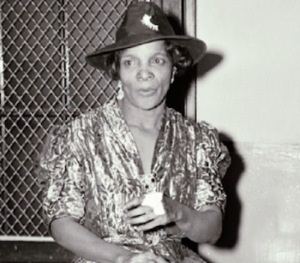
Stephanie Saint-Clair
*Stephanie Saint-Clair was born on this date in 1897. She was a Black gambler and businesswoman who ran numerous criminal enterprises in Harlem, New York, in the early part of the 20th century.
Stephanie Saint-Clair was born of mixed French and African descent in the West Indies to a single mother, Félicienne, who worked to send her daughter to school. She gave Moule Grandterre, French West Indies (present-day Guadeloupe, West Indies), as her place of birth. At age 15, her mother became ill, and she had to leave school. She was employed as a maid by a wealthy family, where their son repeatedly raped her. She managed to save some money and, after her mother died, finally left Martinique for France. Even though she could read and write, she could not find decent employment.
1911, she emigrated to the United States via Marseille in Guiana. She used the long voyage and subsequent quarantine to learn English. In Harlem, she fell in love with a small-time crook who soon tried to prostitute her; she left New York the following night on a bus stopped by the Ku Klux Klan. Several black passengers were hanged or burnt alive in front of her, and she was repeatedly raped. Following this incident, she returned to New York to start her own business, selling drugs with the help of a new boyfriend.
After a few months, she made $30,000 and started her own business. For months afterward, she employed her men, bribed the police, and on April 12, 1917, invested $10,000 of her own money in an underground lottery game in Harlem. As a result of her success in running one of the leading numbers games in the city, she became known in Harlem as "Madame Saint-Clair." She was involved in policy banking, investing, gambling, and playing the lottery. Many banks now would not accept Black customers, so they could not invest legally. Policy banking wasn't technically legal, but it was the only way for blacks in Harlem to invest their money. In this way, she used the underground economy in Harlem to address race politics.
Saint-Clair helped the black community with jobs as numbers runners and other jobs within her business. Because of her success, she lived a lavish life, making over $20,000 a year in the 1920s. She was known to put out ads in the local newspapers, educating the Harlem community about their legal rights, advocating for voting rights, and calling out police brutality against blacks. Once, the police responded by arresting her on a trumped-up charge, and she spent eight months in a workhouse. In response, she testified to the Seabury Commission about the kickbacks she had paid police officers and those who had participated in the Harlem numbers game. The Commission subsequently fired more than a dozen police officers.
After the end of Prohibition, Jewish and Italian-American crime families suffered a decline in profits and decided to move in on the Harlem gambling scene. Bronx-based mob boss Dutch Schultz was the first to move in, beating and killing numbers operators who would not pay him protection. Saint-Clair and her chief enforcer, Ellsworth "Bumpy" Johnson, refused to pay protection to Schultz despite the violence and intimidation by police they faced. St. Clair responded by attacking the storefronts of businesses that ran Dutch Schultz's betting operations and tipping off the police about him. This resulted in the police raiding his house, arresting more than a dozen of his employees, and seizing approximately $12 million (about $172 million in 2019 currency).
Saint-Clair never submitted to Dutch Schultz like many others in Harlem but had her struggles with him and handed off her business to "Bumpy" Johnson. Eventually, her former enforcer negotiated with Lucky Luciano, and Lucky took over Schultz's spots, with a percentage going to "Bumpy." Luciano realized that the struggle with the Five Families was hurting their business, so Schultz was assassinated in 1935. By the 1940s, "Bumpy" Johnson had become the reigning king in Harlem, while Saint-Clair became less and less involved in the numbers game. Saint-Clair retired from the numbers game and became an advocate for political reform.
In the late 1930s, Saint-Clair met her husband, Sufi Abdul Hamid, an anti-Semitic militant activist and leader of an Islamic Buddhist cult. Their marriage officially ended in 1938 when Hamid was shot. Saint-Clair was charged with shooting at him and spent ten years in the Bedford Hills Correctional Facility for Women in New York. After prison, Saint-Clair continued informing those in the community of their civil liberties and writing columns in the local newspaper about discrimination, police brutality, illegal search raids, and other issues facing the black community. Stephanie Saint-Clair died quietly and still wealthy in December 1969, shortly before her 73rd birthday. One year earlier, "Bumpy" Johnson, who returned to live with her and write poetry, had died.